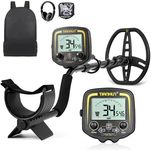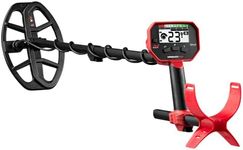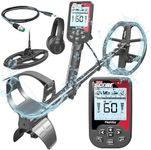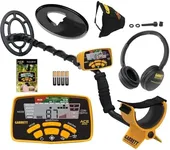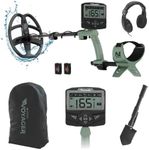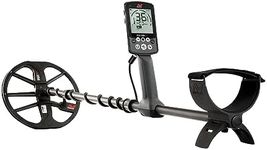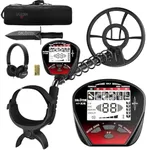Buying Guide for the Best Cheap Metal Detectors
When choosing a metal detector, it's important to consider what you plan to use it for, whether it's for treasure hunting, beachcombing, or finding lost items. Understanding the key specifications will help you select a model that best fits your needs. Metal detectors come with various features and capabilities, and knowing what each one does will guide you in making an informed decision.Operating FrequencyThe operating frequency of a metal detector refers to the number of times the detector's coil sends and receives signals per second. This is important because it affects the detector's sensitivity and depth capabilities. Lower frequencies (around 3-7 kHz) are better for detecting larger, deeper objects, while higher frequencies (above 15 kHz) are more sensitive to smaller objects and fine jewelry. If you're searching for coins or relics, a lower frequency might be more suitable, whereas a higher frequency is ideal for gold prospecting.
DiscriminationDiscrimination is the metal detector's ability to distinguish between different types of metals. This feature is crucial if you want to avoid digging up unwanted items like nails or bottle caps. Metal detectors with good discrimination can filter out 'junk' metals and focus on valuable targets. If you're searching in areas with a lot of trash, a detector with adjustable discrimination settings will be beneficial, allowing you to fine-tune the device to ignore certain metals.
SensitivitySensitivity refers to the detector's ability to detect small or deep objects. Higher sensitivity settings can detect smaller or deeper items, but they may also pick up more interference from the environment, such as mineralized soil or electrical sources. If you're in a clean area with little interference, higher sensitivity can be advantageous. However, in areas with a lot of 'noise,' you might need to lower the sensitivity to avoid false signals.
Ground BalanceGround balance is a feature that helps the metal detector ignore signals from naturally occurring minerals in the soil, which can cause false readings. This is particularly important in areas with highly mineralized soil or saltwater beaches. There are automatic and manual ground balance settings. Automatic ground balance is easier for beginners, while manual ground balance offers more control for experienced users who want to fine-tune their detector for specific conditions.
Coil Size and TypeThe coil is the part of the metal detector that sends and receives signals. Coil size and type can affect the detector's performance. Larger coils can cover more ground and detect deeper objects, but they may be less sensitive to small items. Smaller coils are more precise and better for detecting small objects, but they cover less ground. There are also different types of coils, such as concentric and double-D, each with its own advantages. Consider the type of terrain and the size of the objects you're searching for when choosing a coil.
Weight and ErgonomicsThe weight and ergonomics of a metal detector are important for comfort, especially if you plan to use it for extended periods. A lighter detector is easier to handle and less tiring to use. Ergonomic designs with adjustable shafts and comfortable grips can make a big difference in usability. If you plan to spend a lot of time detecting, look for a model that feels comfortable and balanced in your hands.


